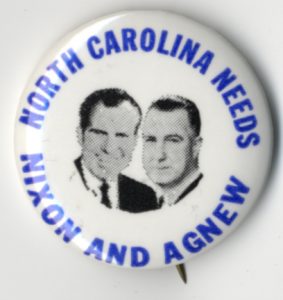“The railway [from Richmond] to Wilmington bears the reputation of being one of the very worst, if not the worst, in the United States. It had, however, been newly laid, and, save for a short distance on which the old timbers of the road were plainly to be felt, struck me as remarkably easy.
“The cars… were more like remnants from the last century than the cars used in the more northern States. [In Weldon], however, we had a new car provided, which approximated more the style of conveyance in vogue among the more civilized.
“The room arranged for [our supper] was not large, and about a hundred travellers entered it. Scarcely were these seated than a horde of strangers — well-dressed ladies, with or without their bonnets, gentlemen in every description of habiliment, and even boys and girls — crowded in.
“One pertinacious and ill-bred, and slightly colored (with a brush be it observed), but remarkably pretty woman, dressed in mourning, raised her eye glass to her brow, and standing at about three feet distance, and exactly opposite where the fair Swede was sitting, contemplated every mouthful eaten by her…. Mademoiselle Lind possessed considerably more modesty, or suffered more from bashfulness, than her admirer, and disappeared in a few minutes, so uncomfortable had she been rendered by this unceasing examination.”
— From “Jenny Lind in America” (1851) by C. G. Rosenberg.
Under the management of P. T. Barnum, “the Swedish Nightingale” gave an enormously successful series of opera concerts in the United States in 1850-1852. En route south to Charleston, the troupe stopped in Wilmington, but Barnum denied fans an impromptu concert because no hall was large enough.

